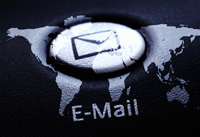Protect against email leakage!
In 2008 there were many high profile and embarrassing Email data loss blunders and eail is now one of the primary outlets of data leakage. We have top tips from Email security specialist, Proofpoint to help you protect confidentiality of personal identity and financial information in outbound email.
 2008 was a year of high profile and embarrassing email data loss blunders from Government ministers, utilities companies and even the Student Union. In November, Alistair Campbell found himself at the centre of a row after an obscene email outburst aimed at BBC journalists.
2008 was a year of high profile and embarrassing email data loss blunders from Government ministers, utilities companies and even the Student Union. In November, Alistair Campbell found himself at the centre of a row after an obscene email outburst aimed at BBC journalists.
According to Proofpoint, an email security specialist, email is already the primary outlet of data leakage and we are only just seeing the tip of the iceberg. Identification of data leakage, either deliberate or unintentional, will continue to grow.
A recent Forrester Research study revealed that 66 per cent of UK companies are “concerned” or “very concerned” about ensuring that email cannot be used to disseminate company trade secrets or valuable intellectual property. And 63 per cent of UK companies are “concerned” or “very concerned” about protecting the confidentiality of personal identity and financial information in outbound email.
To help companies protect both themselves and their staff from data loss mishaps, Proofpoint has come up with following “Safer Email” top tips for businesses and employees:
Email tips for businesses
1. Select your filtering solution wisely. Insist on a gateway-based solution that’s easy to use, highly accurate, quick to deploy and scalable.
2. Act fast to minimise loss. Implement effective processes will help identify, track and resolve any rogue emails through a variety of options including quarantine, deletion, and re-routing back to the original sender for clarification.
3. Focus on your data. Know the value as there are clear differences between a customer’s private information (National Insurance numbers; bank account numbers etc) and company sensitive content (financial accounts; sensitive memos and press releases; blueprints etc)
4.Encrypt. Businesses should ensure that they have an enforcement mechanism in place to prevent sensitive information falling into the wrong hands.
5. Review & Audit. Continually review the information leaving your organisation and make sure it adheres to your outbound security policies. Educate users and continually assessing effectiveness of the policies, updating where necessary.
Email tips for employees
1. Expect to be unlucky! Don’t rely on luck, take care to follow the company guidelines and do your best to be practical. If you are not sure about the value of information – ask. It is always better safe than sorry.
2. Manage your email accounts. A good rule of thumb for the average email user is to keep a minimum of three email accounts. Your work account should be used exclusively for work-related conversations. Your second email account should be used for personal conversations and contacts, and your third email account should be used as a general catch-all for less secure interactions e.g. signing up for newsletters, entering online competitions etc.
3. Avoid fraudulent email. Never respond to an email stating that you’ve won the lottery. If it looks too good to be true, it probably is.
4. Insure your financial information via email. Banks and online stores provide, almost without exception, a secured section on their website where you can input your personal and financial information. They do this precisely because email, no matter how well protected, is more easily hacked than well secured sites. Using your credit card wisely insures you against theft and fraud.
5. Look at your policy. There’s an old saying that it’s better to seek forgiveness than permission. Not in the case of your employer’s sensitive information. If in doubt, don’t send it. Make sure you are up to date on your employer’s email policy, especially when it comes to sensitive or confidential documents.












